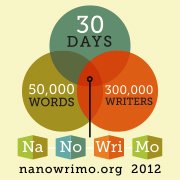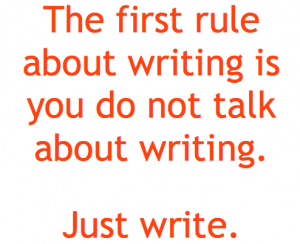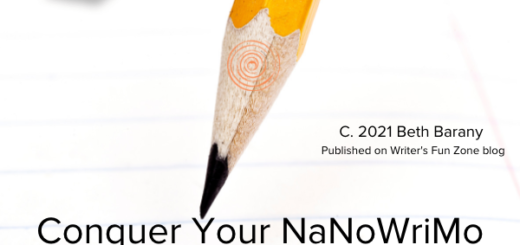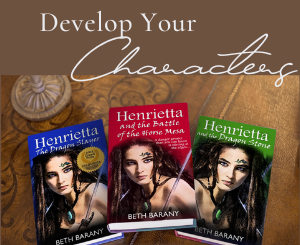Four Unconventional Ways to Prepare for National Novel Writing Month (NaNoWriMo) by Beth Barany
 Because I like to use unconventional methods to prepare for National Novel Writing Month (NaNoWriMo), I thought I’d share them in more detail with you. I shared a few of the things in yesterday’s post that I’m doing as I prepare to edit my novel during the month of November. Actually, I’ve already been editing my novel; I’m just doing it with more focus and intention for November, and if need be, for December, too.
Because I like to use unconventional methods to prepare for National Novel Writing Month (NaNoWriMo), I thought I’d share them in more detail with you. I shared a few of the things in yesterday’s post that I’m doing as I prepare to edit my novel during the month of November. Actually, I’ve already been editing my novel; I’m just doing it with more focus and intention for November, and if need be, for December, too.
As I mentioned in yesterday’s article on 4 Unconventional Ways to Use National Novel Writing Month (NaNoWriMo), I’m editing book 2 in my Five Kingdoms series.
And because I’m editing, I need to switch from writing just for me, which I do for my first draft, to be focused on editing and rewriting and editing some more for my audience, my readers.
I ask myself a series of questions to prepare and use as guideposts while I edit. You use these questions yourself if you’re editing your novel this November or if you’d like to think ahead. These questions follow into 4 categories: Audience, Result, Experience, Time & Energy.
Audience
Who is your audience, really?
List the conventional things about audience: demographics, things you can quantify; and also, psychographics, things that can be described, like beliefs, religious affiliations, hobbies, buying patterns, etc.
I find it useful to brainstorm about my audience in an unconventional way. I learned this tool from some awesome businesses coaches, Jennifer Russell & Bryan Franklin. I’ve adapted it a little for our purposes. Ask yourself — your best guess — about your readers’: hopes; fears; wishes; and, wants and desires.
Amp it up. Go big. Dare. Put yourself in their shoes. You’re writing fiction. Get emotional. Go for the jugular.
 For example: On the demographics/psychographics side: thinking of my current WIP (work-in-progress) book 2 in my Five Kingdoms series, a YA (Young Adult) fantasy, I know based on my first book, the award-winning novel, Henrietta The Dragon Slayer, that my readers are mostly women, ages 20 to 60+; that they buy a lot of books, and are avid readers. I also know based on their reviews that many of them resonant with my strong young woman heroine and like her kick-ass heroism.
For example: On the demographics/psychographics side: thinking of my current WIP (work-in-progress) book 2 in my Five Kingdoms series, a YA (Young Adult) fantasy, I know based on my first book, the award-winning novel, Henrietta The Dragon Slayer, that my readers are mostly women, ages 20 to 60+; that they buy a lot of books, and are avid readers. I also know based on their reviews that many of them resonant with my strong young woman heroine and like her kick-ass heroism.
As for the hopes; fears; wishes; and, wants and desires, — and this is based on reviews people have given me and conversations I’ve had with readers and my own gut check — my readers hope for strength and courage; they fear helplessness, and not being able to be there for themselves and their loved ones; they wish they could pursue their passions; and they desire a lot! A delicious, juicy fully-lived life, rich with emotions, great friends, wonderful camaraderie and a sense of a deep purpose that provides them guidance through their everyday lives. They want to matter, even in small ways, and they want to believe that they matter in those small and large ways.
Wow! That was fun! I brainstormed right in front of you. Minus the typos. I took those out so you could read what I had to say.
Your turn! Who is your audience, really?
Result
What result do your readers want?
This may be a restatement from what you discover above.
In fiction, we’re usually not teaching our readers how to repair their car, run a business, or lose 15 pounds. However, they may get a direct result from reading your book. So I’ve added it here, to not leave it out.
In my case, when I ask myself this question, I state what my readers’ experience can be — not a result — and that leads us right to the next category.
Experience
What do I want the reading experience of my book to be like for my readers?
Get deep. Get emotional. Go for the deepest reason.
For example: for my book 2 in my Five Kingdoms series, a YA fantasy, I know based on my first book, the award-winning novel, Henrietta The Dragon Slayer, that my readers are looking for an escape, a good read that will take them away from it all and inspire them. I want my readers to feel empowered, to feel they can accomplish whatever they set their minds to, and to feel re-invigorated from the time away from their everyday life.
Lastly, I get clear with myself on my time commitment and attention I can give my editing. That’s the fourth unconventional way I prepare for nanowrimo.
When are my best writing times?
Do you ever notice that you love to write in the wee hours of the morning? (Nope that’s not me.) Or the very late hours of the night? (Okay, that’s me, sometimes.) Or, are you like me and you like to write mid-morning to early afternoon? Outside. At a cafe. With the sun at your back. (Yep, that’s me, in an ideal world.)
Be honest with yourself, and dare to share with yourself when is your best writing time of day — even if it’s inconvenient for the way your life is set up right now. We’ll get to practicalities in a moment. For right now, dream big and truthfully.
How can I break the writing time into bite-sized daily chunks?
What works for me during this editing process is just to track my time, not my word count, like I do when I’m writing my first draft. My general goal is as close as I can get to an hour 4-5 days a week.
And what days will I work on the book, really?
This is where I get out the calendar and actually schedule times in my calendar all throughout the month. Yep, making a date with myself!
So, as you prepare for NaNoWriMo in your unconventional way, use these questions as a guide and get cracking!
As I was telling one of my clients today, there really is only one rule in writing and that is TO WRITE.
***
And that note, I’m offering 10 complimentary coaching sessions in November to people who’ve never had one from me.
Sign up for your 60-Minute Complimentary Coaching Discovery Session here.
Yep, I’m a novelist AND I help authors create successful books and careers, as a writing coach and advisor.
If you want personalized, tailored one-on-one support, I can help you with that too.
Contact me for a Discovery Session too see how a writing coach, award-winning author, Certified Creativity Coach and Master NLP Practitioner can help you fall in love with your writing, again.
One of my clients recently said: “I know I’ve said this before, but THANK YOU for all of your help. Your support, your words of encouragement, and your insightful feedback on my work, and your thoughts on writing process/practice have been immensely helpful.” — Lucy Curran, Author, San Francisco, CA
Sign up for your 60-Minute Complimentary Coaching Discovery Session here.
I only give away 10 slots per month. First Come First Serve! Click here now to schedule yours: Online Scheduler
PS. You can also sign up for my free Writer’s Motivation Mini-Course to the right on this blog or here.








A very interesting take on the age old problems of how to know what to write and how to go about writing it in a way that is most appealing to as broad a range of people as possible.
Hi, Beth! Thanks for this excellent advice, and I will be using all of it, since I mean to do a massive push to get my wip done by the end of November! It’s going to be intense. And I think, as you stated more than once, that the key is the emotional connection, both to the work and to the readers. And let me just take this opportunity to say, as well, that your coaching sessions have been tremendously helpful in my efforts at self-observation, getting over all my myriad “stuff,” and of course, the process of dreaming myself into my “ideal writer!” I have faith! It can be done! Hope we speak again soon, much love,
Shannon
Johnson, Thanks! I’m glad you liked my very interesting take!
Shannon, I am so glad to hear that my excellent advice us useful to you! I know you can do it! We’ll be right there with you! Let’s schedule a time to talk soon, when you’re in the thick of it, to help you get to the finish line! Much love,
Beth